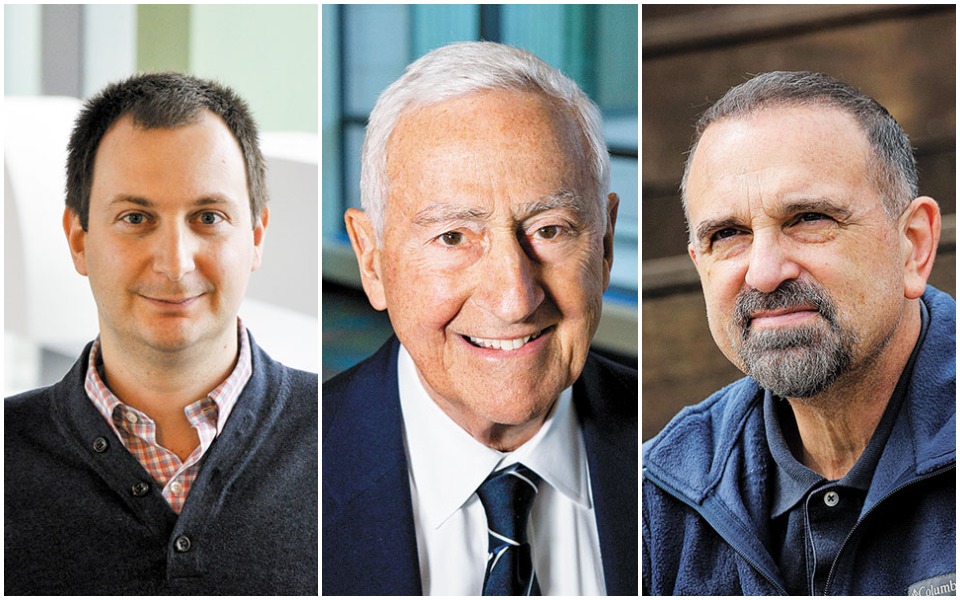The great Greeks of Regeneron

In an interview with Kathimerini on April 26, Christos Kyratsous, vice president of research, infectious diseases and viral vector technologies at Regeneron Pharmaceuticals, said the company was optimistic it could develop a coronavirus treatment by fall. “The solution is an antibody treatment that shields a healthy person and cures an ill person. The goal is to greatly reduce mortality, to reduce insecurity and when a safe vaccine is developed in the next one or two years, humanity can return to normalcy,” he said.
Kyratsous could not have imagined that a dose of Regeneron’s experimental antibody cocktail would be administered to Donald Trump – in fact while the US president was still at the White House a few hours before being admitted to hospital where he stayed for three days. Two days after he had left the Walter Reed National Military Medical Center, Trump posted a video message in which he praised Regeneron’s drug cocktail. “To me, it wasn’t therapeutic. It just made me better. I call that a cure,” Trump said. Skeptics say that Trump’s euphoria could be a side effect of Dexamethasone, a steroid he received in order to protect his immune system from going into overdrive. However, all indications converge on the assessment that the president’s infection was treated intensively and the first symptoms that led him to the hospital subsided rapidly.
On July 26, Kathimerini published an interview with Roy Vagelos, chairman of Regeneron’s board, who said that the company would have news on the effectiveness and safety of its antibody cocktail by late summer or early fall. Speaking again to Kathimerini in October, Vagelos said: “If the Regeneron antibody cocktail is shown to be effective and safe in controlled clinical trials and approved by the FDA, it will be important for treating Covid-19 infected patients and very good news. The major long-term objective for people and economies across the globe would be a safe and effective vaccine that protects people against infection by this terrible virus.”
According to US press reports, Trump is friends with Regeneron CEO Leonard Schleifer. Schleifer and George Yancopoulos, now president of Regeneron, founded the company in 1998. In 1995, Vagelos, former chief executive of Merck & Co Inc, invested in Regeneron because, as he told Kathimerini, he could see that the company employed many great scientists. Regeneron has in recent months received more than $500 million in state funds as part of the administration’s Operation Warp Speed vaccine program. The company has signed a supply contract for up to 300,000 doses of the antibody cocktail. it has also reached a deal with Roche for the production of 250,000 doses per month as of early 2021. On October 7, the company submitted an application to the Food and Drug Administration (FDA) for an emergency use authorization of the drug that was administered to the US president.
Kathimerini contacted Kyratsou again to ask him about the effectiveness and availability of the drug cocktail.
“We announced data from our non-hospitalized, confirmed Covid-19-positive, symptomatic patients. This first analysis included data from 275 patients and showed that administration of the mAb cocktail can decrease viral load (accelerate viral clearance) and accelerate time required for amelioration of symptoms, especially in patients that have not yet mounted their own effective immune response and/or have high viral load,” Kyratsou said.
“We are actively working with regulatory agencies, both here in the US and with our partners outside the US to ensure timely availability of the treatment,” he said.
“I cannot give specifics on the timeline. We are working diligently with regulatory agencies and also working to continue accumulating data from our clinical trials,” he said.
How the treatment works
The antibody treatment was based on mice. If the organism of a mouse is infected with a virus, it immediately produces antibodies. These antibodies can be introduced into a patient’s body in order to fight the same virus. A key problem is that the human immune system can reject the antibodies because although they look similar, they are not exactly human.
In order to solve this problem, Regeneron created genetically engineered mice which had immune systems more closely related to the human version. The company called them “magic mice” and it now has thousands of them. When these mice are infected with a virus, they generate the same antibodies as a human patient carrying the same virus. When introduced into a human body, these antibodies are not rejected and, as a result, accelerate treatment as the infected organism is quickly equipped with antibodies that it would otherwise need many days to produce as the virus would continue to spread. Those “magic mice” generate hundreds of different antibodies against the coronavirus. The scientists at Regeneron were able to identify the two antibodies that bind to the coronavirus’ spike protein, limiting the ability of the virus to escape. Tests conducted so far have shown that the drug cocktail works, speeding up recovery, a fact which seems to be backed up by the case of Trump.
Regeneron is active in the treatment of many different viruses. In recent years, more than 50 clinical trials with many different antibodies generated by those “magic mice” have been completed or are in progress. No side effects in human patients have been reported to date. Furthermore, the company’s antibody therapy was effective against Ebola when the disease reappeared in 2018 in the Republic of the Congo. Taking all this into consideration, Trump’s medical team apparently decided that the risk of administering the experimental cocktail was very small compared to the risk of allowing the virus to multiply uncontrollably. Barring any unexpected developments, the names of these three Greek scientists and visionaries will forever be associated with solving the biggest public health problem of the last 100 years.





